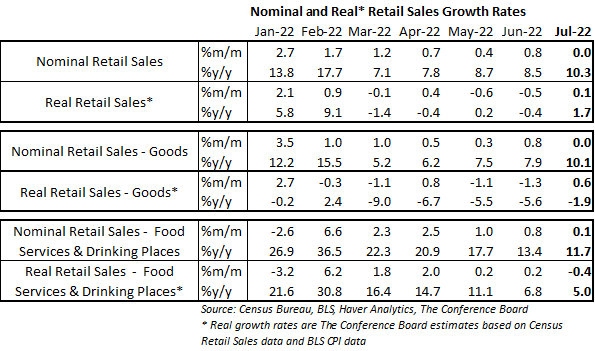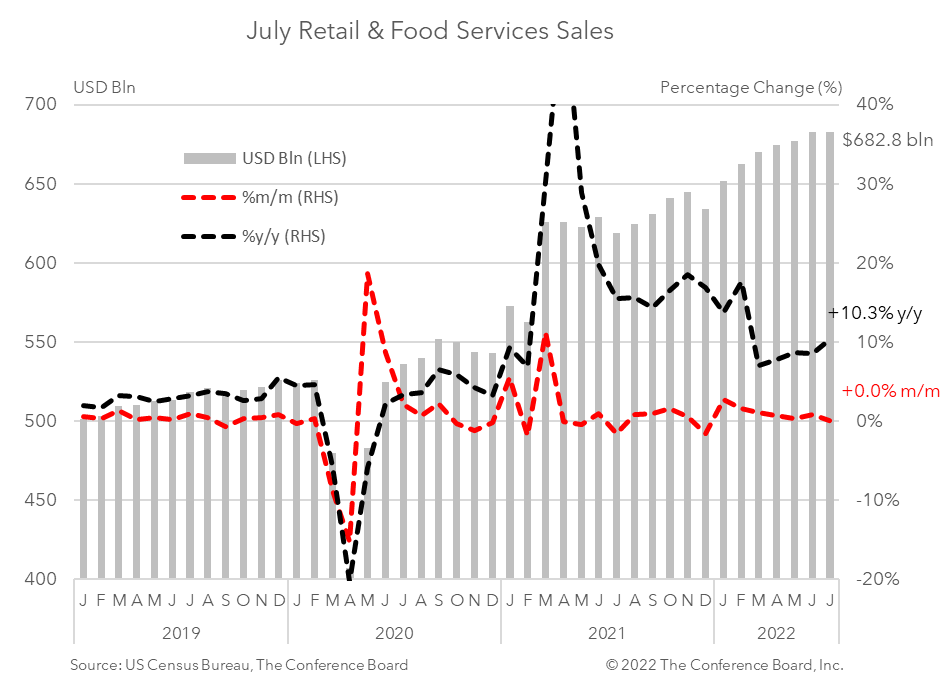July retail sales flat as gasoline prices fell
17 Aug. 2022 | Comments (0)
The latest retail sales data show an economy that is continuing to cool. Retail spending rose by only $0.2 billion to $682.8 billion in July — remaining essentially flat month-over-month but up 10.3 percent from a year earlier. When adjusted for inflation, which moderated in July, sales were also roughly flat.* Gasoline sales fell for the month, reflecting lower prices at the pump. Looking ahead, we expect consumer spending growth to fall into negative territory as the economy slips into recession.

Consumer demand for goods was muted in July driven by falling gasoline prices. Spending on goods rose 0.0 percent from the previous month in nominal terms, following 0.8 percent growth in June. Spending on motor vehicles and parts declined 1.6 percent in July from June, while retail sales excluding motor vehicles and parts rose by 0.5 percent month-over-month. Spending at gasoline stations dropped 1.8 percent for the month as crude oil prices slipped from their June highs. Retail sales less motor vehicles, gasoline, and building supplies (known as “Retail Control”) benefited from lower fuel prices and grew 0.8 percent from the previous month. Online sales were strong as spending at non-store retailers rose 2.6 percent in July. When adjusting goods spending for CPI inflation the real growth rate was up about half a percentage point from the previous month.* This uptick reflects lower gasoline prices and is likely temporary.
Meanwhile, spending at food services and drinking places rose by just 0.1 percent month-over-month, vs. 0.8 percent in June - suggesting the much discussed rebound in consumer spending on in-person services may be coming to an end. The reading was the smallest uptick since January 2022, when the spread of Omicron kept many consumers at home. Upon adjusting spending on food services and drinking places for CPI inflation, the real growth rate was down about half a percentage point from the previous month.*
US consumers were granted some reprieve from inflation in July as gasoline prices dropped. However, the net effect on spending was muted as inflation in other parts of the economy continued to eat away at purchasing power. Looking ahead, we expect inflation to continue to constrain consumer spending as interest rates continue to rise. The combined impact will likely result in a sustained contraction in consumer spending as the US economy slips into recession.
* Real growth rates are The Conference Board estimates based on Census Retail Sales data and BLS CPI data

-
About the Author:Erik Lundh
Erik Lundh is Senior Global Economist for The Conference Board Economy, Strategy & Finance Center, where he focuses on monitoring global economic developments and overseeing the organization&rsquo…




0 Comment Comment Policy